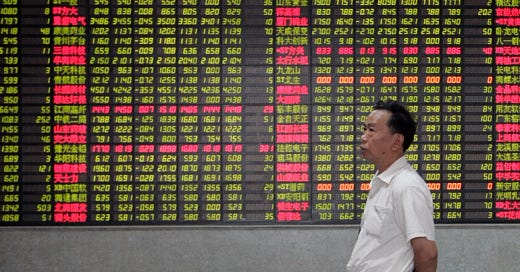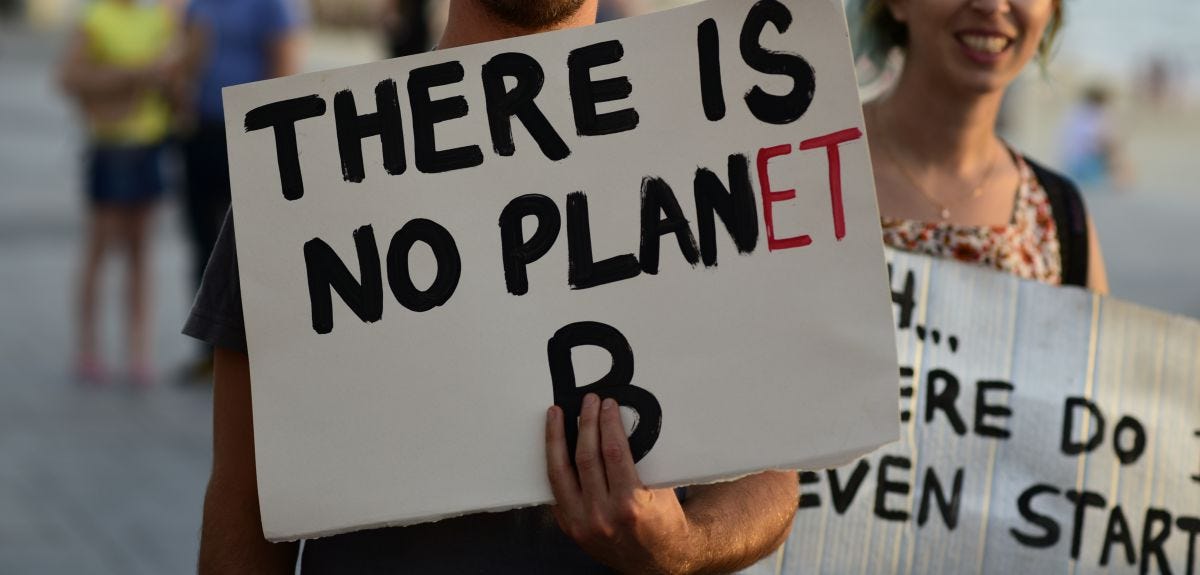Emerging Markets Monitor - Sept. 30
China Shares Plunge in Hong Kong, China Banks to Defend Yuan, Latin America's Leftward Shift, Eurozone Prices Soar, Climate Change and Rising Droughts
The Top 5 Stories Shaping Emerging Markets from Global Media - Sept. 30
China Shares Plunge to Lowest Valuation on Record in Hong Kong
Bloomberg
“Grim milestones keep piling up for Chinese stocks listed in Hong Kong.”
“As September draws to an end, the Hang Seng China Enterprises Index has lost 14% to rank as the worst performer among major equity benchmarks globally this month. Hovering around the lowest since the global financial crisis, it is now trading at 0.6 times book value, the cheapest ever.”
“All but three stocks are down the year on the 50-member gauge, with property developers and tech companies at the bottom. China’s largest builder Country Garden Holdings Co. has lost almost three quarters of its value and video streaming firm Bilibili Inc. is down about two thirds.”
“While the swoon is part of a global rout as central banks around the world step up rate hikes to tame inflation, Chinese stocks have been hit particularly hard as the Covid-Zero policy took a toll on the nation’s economy and as Sino-American tensions worsened over Taiwan and Russia.”
“Also, unlike the mainland, Hong Kong’s open capital market means foreign investors can pull their money out anytime they want, making it prone to bigger swings amid macro headwinds.” WSJ reports.
China State Banks Told to Stock Up to Defend Depreciating Yuan
Reuters
“China's central bank has asked major state-owned banks to be prepared to sell dollars for the local unit in offshore markets as it steps up efforts to stem the yuan's descent, four sources with knowledge of the matter said.”
“State banks were told to ask their offshore branches, including those based in Hong Kong, New York and London, to review their holdings of the offshore yuan and ensure U.S. dollar reserves are ready to be deployed, three of the sources, who declined to be identified, told Reuters.”
“….The simultaneous selling of dollars and buying of yuan could put a floor under the Chinese currency, which has lost more than 11% to the dollar so far this year and looks set for its biggest annual loss since 1994, when China unified its official and market rates.”
“…While the yuan's depreciation has been gradual and in line with the decline in major currencies against a dollar buoyed by aggressive Federal Reserve monetary tightening, its decline to the weaker side of 7-per-dollar has raised concerns about domestic sentiment and potential capital outflows.” Reuters reports.
As Lula Leads in Brazil Election Polls, Latin America’s Leftward Shift Grows
Miami Herald
“Virtually all polls agree that leftist former President Luiz Inácio Lula da Silva is likely to win Brazil’s elections on Sunday, which would turn most of Latin America into a leftist-ruled region.”
“If Lula defeats Brazil’s far-right incumbent President Jair Bolsonaro, Latin America’s seven biggest economies — Brazil, Mexico, Argentina, Colombia, Venezuela, Chile and Peru — will soon be run by leftist and ultra-leftist leaders. In addition, several smaller economies, such as Bolivia, Nicaragua and Honduras, are also led by leftist or far-left presidents.”
“An average of recent polls suggests that Lula will win Sunday’s election with at least 45% of the vote, followed by Bolsonaro with 33%. If no candidate reaches 50% of the vote in this first-round election, polls show that Lula will most likely win a runoff held Oct. 30.”
“…There are three main reasons why a Lula victory is not likely to mark a return of a powerful leftist regional bloc like the one that dominated Latin America’s politics in the early 2000s.”
“First, most of the region’s leftist-ruled countries are in deep financial trouble. And with China’s economy falling fast, they can no longer expect it to give them huge rescue loans in exchange for political influence.”
“Unlike the early 2000s, when Latin American commodity prices were at record highs and former Venezuelan populist leader Hugo Chávez crisscrossed the region promising to build massive infrastructure projects, most of the region’s current leftist leaders have no funds to help their political allies abroad.” Andres Oppenheimer reports.
Eurozone Inflation Hits New High As Energy Prices Continue To Rise
Financial Times
”Inflation in the euro area hit a new high for the 11th consecutive month as energy prices continued to rise, bolstering calls for the European Central Bank to continue aggressive interest rate rises when it meets next month.”
“Consumer prices in the eurozone rose 10 per cent in the year to September, accelerating from 9.1 per cent in August, which was already the highest level in the euro’s 23-year history.”
“The price rises also outstripped the 9.7 per cent expected by economists polled by Reuters. Russia’s squeezing of gas supplies to Europe after its invasion of Ukraine has sent energy prices surging and forced governments to intervene by spending hundreds of billions of euros to shield consumers and businesses from the fallout.”
“Energy prices rose 40.8 per cent in September, up from 38.6 per cent the previous month, according to a flash estimate by Eurostat, the European Commission’s statistics arm.”
“…Economists expect the 19-country bloc to fall in recession this winter, as households reduce their spending and industrial groups cut back on production.” The FT reports.
Climate Change to Bring Enhanced Droughts Worldwide
WaterWorld
“New research from the University of East Anglia (UEA) finds that rising global temperatures will bring significant risks of more frequent and longer-lasting droughts for India, China, Ethiopia, Ghana, Brazil, and Egypt.”
“The study, published in the journal Climate Change, shows that even a modest increase of 1.5°C could bring major enhancements to droughts in the six countries. The study had chosen those countries for their variance in size, development, and biome composition.”
“The paper estimated the impacts that different degrees of global warming — between 1.5°C and 4.0°C — would have on the probability and length of severe drought.”
“…Using standard population projections, it is estimated that 80 per cent to 100 per cent of the population in Brazil, China, Egypt, Ethiopia and Ghana (and nearly 50 per cent of the population of India) are projected to be exposed to a severe drought lasting one year or longer in a 30-year period,” continues Price. “In contrast, we find that meeting the long-term temperature goal of the Paris Agreement, that is limiting warming to 1.5 °C above pre-industrial levels, is projected to greatly benefit all of the countries in this study, greatly reducing exposure to severe drought for large percentages of the population and in all major land cover classes, with Egypt potentially benefiting the most.” WaterWorld reports.
"You can’t cross the sea merely by standing and staring at the water."
— Rabindranath Tagore







